Bid Or Tender Rejection Letter
Subject: Rejection of Bid/Tender
Dear [Recipient's Name],
I hope this letter finds you well. I am writing to inform you that after careful consideration and evaluation of all the received bids/tenders, we regret to inform you that your bid/tender, submitted on [date], for [project name or description], has not been selected for further consideration.
I want to express our gratitude for the effort and time you put into preparing and submitting your bid/tender. Your submission was comprehensive and showcased your expertise in the field. However, after a thorough evaluation process, we have chosen another bid/tender that aligns more closely with our requirements, priorities, and project objectives.
Please understand that the decision-making process was based on various factors, including but not limited to pricing, technical capabilities, past performance, delivery timelines, and overall suitability for the project. While we recognize the strengths of your bid/tender, the selected bid/tender best fulfilled our specific needs and constraints.
We appreciate your interest in working with our organization and assure you that your bid/tender was given fair and careful consideration. We encourage you to participate in future bidding/tendering opportunities with us. Your expertise and capabilities are valuable, and there may be projects in the future where your proposal aligns more closely with our requirements.
Once again, thank you for your efforts and interest in our project. Should you have any questions or require feedback regarding your bid/tender, please feel free to contact us at [your contact information]. We would be happy to provide constructive feedback to help you enhance future submissions.
We wish you success in your future endeavors and hope to have the opportunity to collaborate on future projects.
Yours sincerely,
[Your Name]
[Your Title/Position]
[Your Organization]
Formal Bid Rejection Letter
Subject: Bid Rejection Notification
Dear [Bidder's Name],
We would like to thank you for submitting your bid for [Project/Contract Name]. After careful evaluation of all received proposals, we regret to inform you that your bid was not selected.
Please note that the decision was based on [brief reason, e.g., pricing, compliance, technical evaluation], and we appreciate the effort and resources you put into your submission.
We encourage you to participate in future tenders and thank you for your interest in our projects.
Sincerely,
[Your Name]
[Your Position]
[Company/Organization Name]
[Date]
Casual Email Rejection of Tender
Subject: Tender Outcome – [Project/Contract Name]
Hi [Bidder's Name],
Thank you for submitting your tender for [Project/Contract Name]. Unfortunately, your proposal was not selected this time.
We appreciate your effort and hope to see your participation in future opportunities.
Best regards,
[Your Name]
[Position]
[Company Name]
Detailed Official Rejection Letter
Subject: Bid Rejection – [Project/Contract Name]
Dear [Bidder's Name],
We appreciate your interest in the [Project/Contract Name]. After a thorough review of all submitted bids, your proposal was not chosen.
The evaluation committee found that [reason, e.g., your bid did not meet technical specifications or budget requirements]. We acknowledge the quality and effort of your submission and encourage you to participate in future tenders.
Thank you for your interest and understanding.
Sincerely,
[Your Name]
[Position]
[Organization Name]
[Date]
Quick and Simple Bid Rejection Email
Subject: Tender Rejection Notice
Dear [Bidder's Name],
Thank you for your bid for [Project/Contract Name]. We regret to inform you that your bid has not been accepted.
We appreciate your effort and hope you will participate in future tenders.
Regards,
[Your Name]
Provisional Rejection Letter
Subject: Preliminary Bid Rejection – [Project/Contract Name]
Dear [Bidder's Name],
We wish to inform you that your bid for [Project/Contract Name] is currently not being considered for final selection. This is a provisional decision pending the completion of the full evaluation process.
We will notify all participants once the final decisions are made. Thank you for your understanding and participation.
Sincerely,
[Your Name]
[Position]
[Company Name]
Heartfelt Bid Rejection Letter
Subject: Thank You for Your Tender Submission
Dear [Bidder's Name],
Thank you sincerely for your bid for [Project/Contract Name]. After careful review, we regret to inform you that your proposal was not selected.
We genuinely value the effort, creativity, and resources you invested, and we hope to receive your bids in our upcoming projects. Your participation is greatly appreciated.
Warm regards,
[Your Name]
[Position]
Formal Rejection with Feedback
Subject: Bid Rejection and Feedback – [Project/Contract Name]
Dear [Bidder's Name],
We appreciate your submission for [Project/Contract Name]. After thorough evaluation, your bid was not successful.
The main reasons for rejection are [specific reasons, e.g., technical non-compliance, pricing]. We hope this feedback will help you improve your future submissions.
Thank you for your participation.
Sincerely,
[Your Name]
[Position]
[Organization Name]
What is a Bid or Tender Rejection Letter and Why Is It Needed?
A bid or tender rejection letter is a formal communication sent to notify applicants that their proposal for a project, contract, or tender was not accepted.
Purpose:
- Communicate the outcome of the bidding process clearly.
- Maintain professional relationships with bidders.
- Provide closure and encourage future participation.
Who Should Send a Bid or Tender Rejection Letter?
- Project managers or procurement officers handling bids.
- Company executives or authorized personnel managing tenders.
- Government agencies or corporate departments responsible for public tenders.
Whom Should the Letter Be Addressed To?
- The bidder or tender applicant whose submission is being declined.
- Optionally, copy may be sent to internal departments for record-keeping.
- For corporate tenders, legal or procurement teams may also receive documentation.
When Should You Send a Bid or Tender Rejection Letter?
- Immediately after final evaluation of all bids.
- When preliminary bids are not meeting required specifications (provisional rejection).
- After the selection committee has made a decision but before announcing winners.
- To provide timely feedback to bidders for future opportunities.
How to Write and Send a Bid or Tender Rejection Letter
- Begin with a clear subject indicating bid rejection.
- Address the bidder by name and reference the project or tender.
- Thank the bidder for their submission.
- Provide a brief reason or status of rejection.
- Include encouragement for future participation.
- Close formally and provide contact information for queries.
- Choose the appropriate mode: email or printed letter, based on prior communication.
Requirements and Preparations Before Sending a Rejection Letter
- Verify evaluation results and ensure final decision is approved.
- Gather reasons for rejection (general or specific, depending on policy).
- Maintain a list of all bidders for documentation.
- Decide tone and style: formal, neutral, or empathetic.
- Ensure compliance with company or regulatory communication policies.
Formatting, Tone, and Style Guidelines
- Length: 1–2 concise paragraphs.
- Tone: Professional, polite, and neutral. Avoid negative or harsh language.
- Style: Clear and structured. Include project reference, decision, and thanks.
- Mode of sending: Email is common; printed letter for official tenders.
- Etiquette: Respectful acknowledgment of bidder’s effort.
After Sending a Bid or Tender Rejection Letter
- Confirm receipt if sent electronically.
- Document the rejection in internal records for auditing purposes.
- Be prepared to answer any queries or requests for feedback.
- Encourage future participation and maintain professional rapport.
Pros and Cons of Sending a Bid or Tender Rejection Letter
Pros:
- Maintains transparency and professionalism.
- Encourages continued interest from bidders.
- Reduces misunderstandings or disputes.
Cons:
- Potential dissatisfaction or negative feedback from rejected bidders.
- Requires careful wording to avoid legal or reputational issues.
Common Mistakes to Avoid in Bid Rejection Letters
- Using vague or overly harsh language.
- Delaying notification beyond reasonable time.
- Failing to reference the project or tender properly.
- Omitting thanks or acknowledgment of effort.
- Providing misleading or incorrect reasons.
Key Elements and Structure of a Bid or Tender Rejection Letter
- Subject line: Clear mention of bid rejection.
- Opening: Address the bidder and reference the project.
- Body: Thank the bidder, provide reason for rejection (optional), encourage future participation.
- Closing: Formal sign-off with contact information.
- Date and signature: Mandatory for official correspondence.
- Optional attachments: Evaluation summary or feedback (if company policy allows).
FAQ About Bid or Tender Rejection Letters
Q: Should I provide detailed feedback?
A: Only if company policy allows; otherwise, keep reasons general.
Q: Can a rejected bidder appeal?
A: Some organizations allow queries or clarification requests, but final decisions are usually binding.
Q: Is email sufficient for official tenders?
A: Yes, if pre-approved; otherwise, a printed letter may be required.
Q: How soon should the letter be sent?
A: As soon as the evaluation is complete to maintain transparency.
Tips for Writing an Effective Bid or Tender Rejection Letter
- Keep it concise and professional.
- Acknowledge the bidder’s effort and time.
- Provide reasons carefully to avoid disputes.
- Use neutral, courteous language.
- Ensure clarity by referencing project or tender details explicitly.
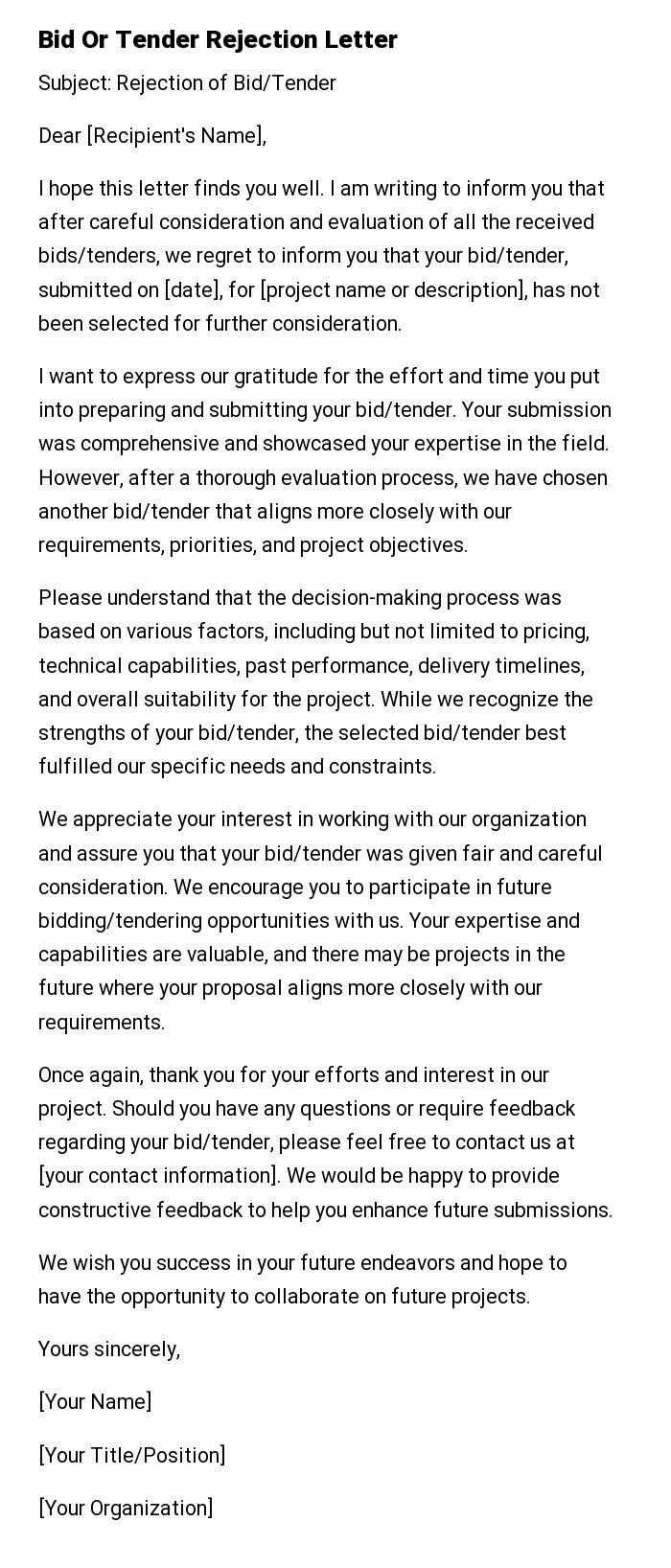
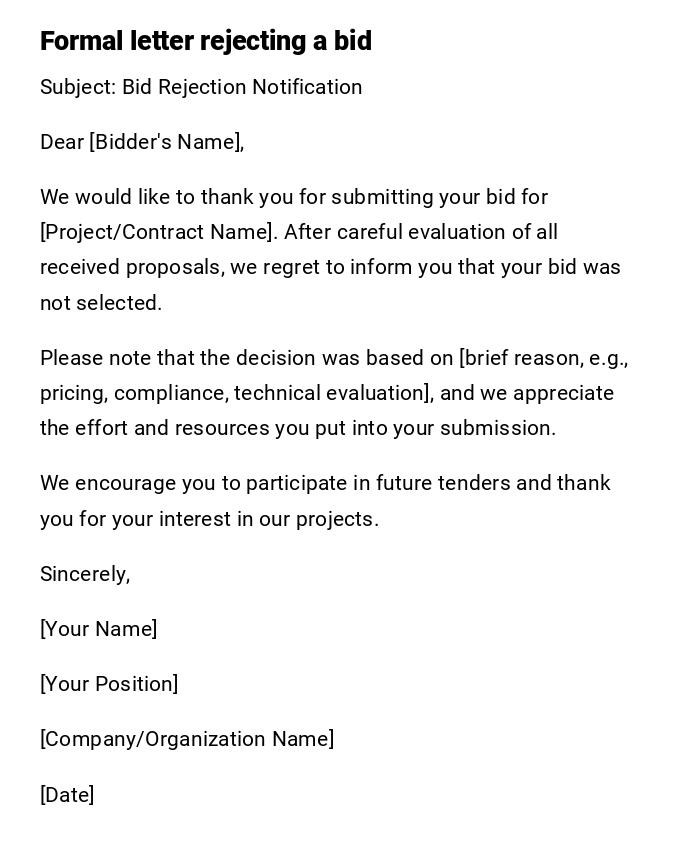
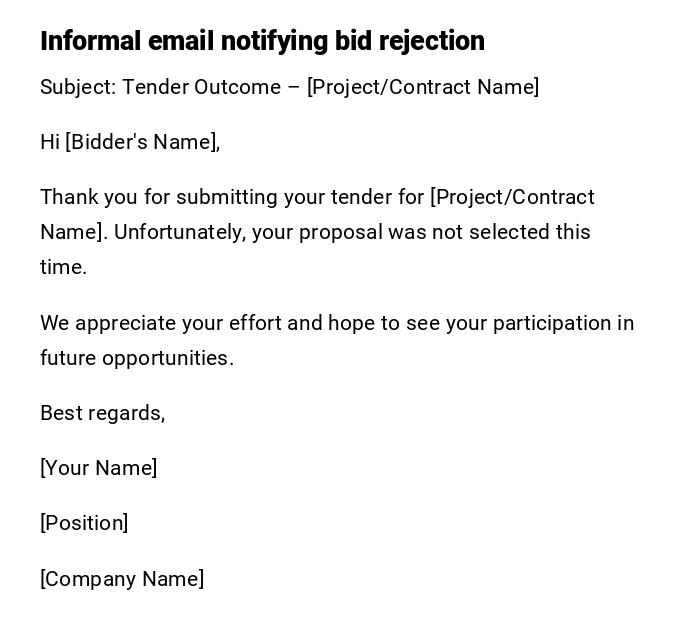
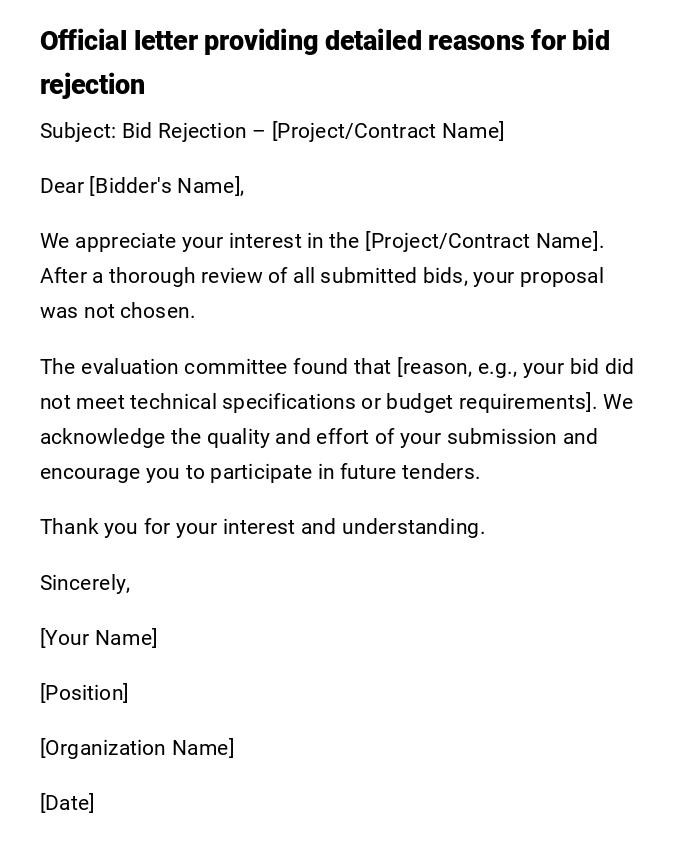
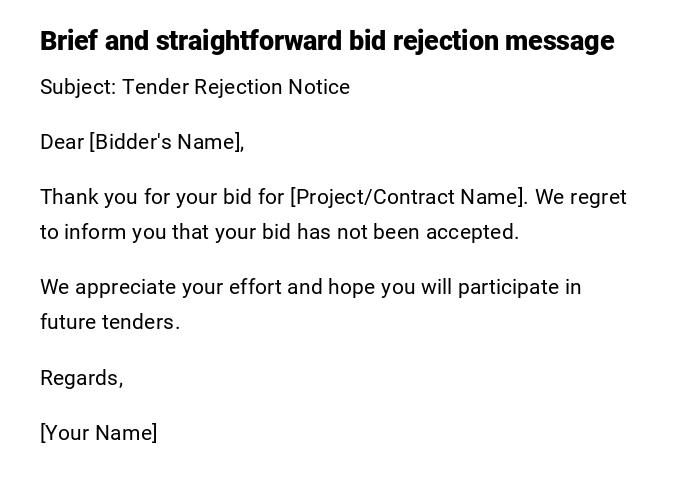
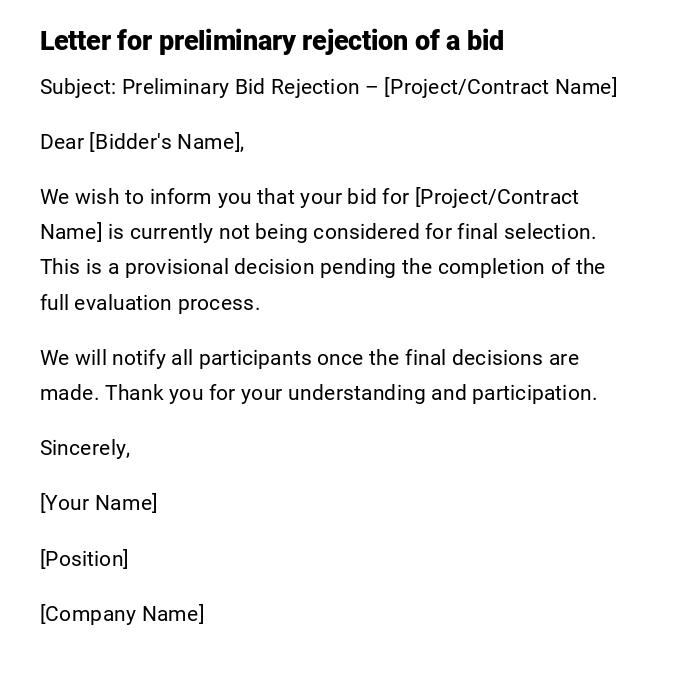
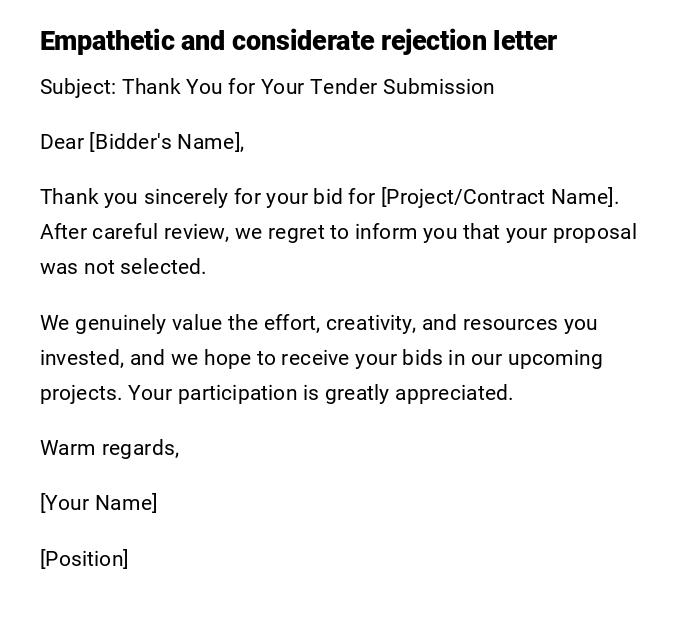
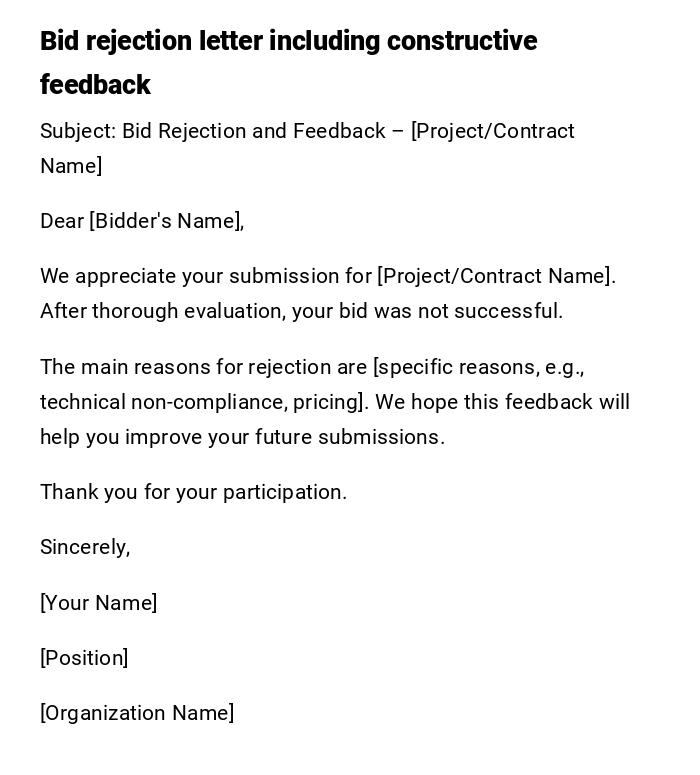

 Download Word Doc
Download Word Doc
 Download PDF
Download PDF